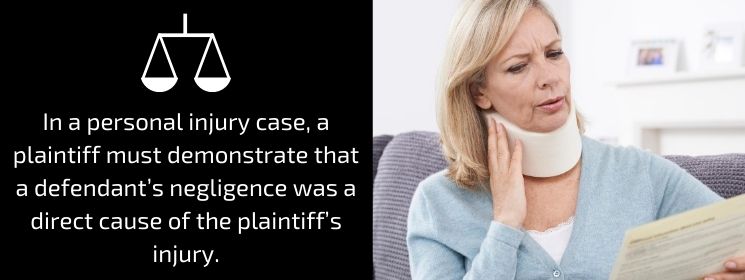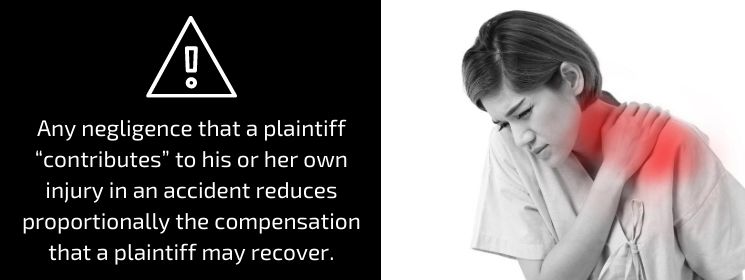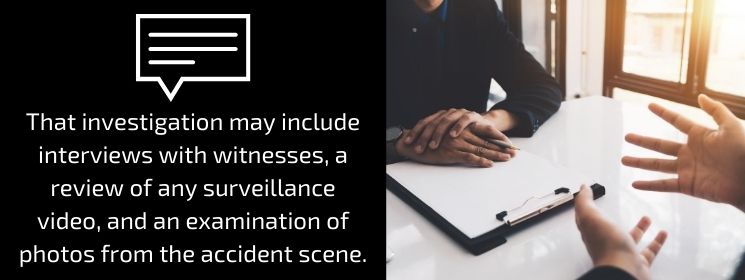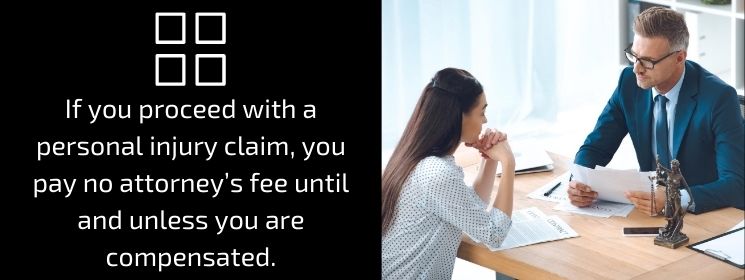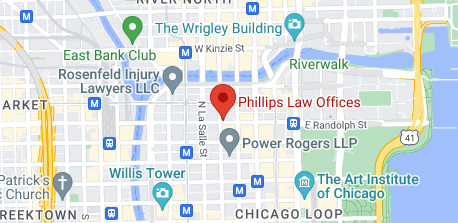If you’re injured by someone else’s negligent actions or behavior, you have the right to file a personal injury claim. A personal injury claim is a demand for the at-fault party to compensate you for your injuries. To file a claim in Illinois, speak with a Chicago personal injury attorney.
But what if more than one party is to blame for an accident? Can you file an injury claim if you are partially responsible for your own personal injury or injuries? You’ll learn the answer – and more about your rights – by reading this brief discussion of negligence and personal injury law.
Before you can know if compensation is available for an injury that’s partially your own fault, you need to know how the law defines “negligence” and what role negligence plays in personal injury cases. Here are some definitions.
What is a Duty of Care?
In a personal injury case, the injured party is called the “plaintiff,” and the party that is accused of negligence is called the “defendant.” A “duty of care” is a person’s obligation to act in a way that avoids injuring others.
For instance, when someone gets behind the wheel of a car or truck, that driver owes a duty of care to other drivers, passengers, and pedestrians. Drivers have a duty to be careful because when they aren’t, their driving could harm others.
In a personal injury case, a plaintiff must demonstrate that a defendant’s negligence was a direct cause of the plaintiff’s injury. To accomplish this, a plaintiff must prove that the defendant owed the plaintiff a duty of care, that the duty was breached, and as a result, the plaintiff was injured.
The legal definition of negligence is “breaching a duty of care.” Motorists breach their duty of care, for example, when they drive under the influence or drive while texting. If breaching the duty of care directly results in an injury, the injury victim is entitled to compensation.
Can Different Parties Be At-Fault for the Same Accident?
But if you’re involved in an accident, and you’re injured, your own negligence may have been partially responsible. Here are several examples of how that might happen:
1. When you’re a pedestrian, if a speeding driver hits you while you’re crossing the street, that driver is responsible, but if you were jaywalking, you are also partially responsible.
2. When you’re driving, if an intoxicated driver runs a stop sign and collides with your vehicle, that driver is responsible, but if you were speeding at the time – even a little – you may also be partially responsible.
What is “Pure Comparative Negligence” In Illinois?
In Alvis v. Ribar (1981), the Illinois Supreme Court established that “pure comparative negligence” is the law in Illinois. Any negligence that a plaintiff “contributes” to his or her own injury in an accident reduces proportionally the compensation that a plaintiff may recover.
Let’s say that you are driving nine or ten miles per hour over the speed limit when an intoxicated driver – whose blood alcohol content measures twice the legal limit – drives through a stop sign at thirty miles per hour over the speed limit, crashes into your vehicle, and seriously injures you.
You file a personal injury claim, but the other driver’s auto insurance company disputes the claim because you were speeding, so your case goes to court. At the trial, a jury finds that you had fifteen percent of the responsibility for the accident.
How is “Contributory” Negligence Handled in Illinois?
In such a case in Illinois, if your damages totaled $100,000, your compensation would be reduced by fifteen percent, so you would receive $85,000 in damages. In Illinois, the burden of proving a plaintiff’s contributory negligence in these cases falls on the defendants.
However, if a plaintiff’s contributory negligence exceeds fifty percent in any accident, a defendant will be deemed “not liable,” and the plaintiff cannot recover damages.
Determining which party or parties is liable for an accident, and determining the percentage of each party’s responsibility for the accident, can be the most difficult aspect of a personal injury case. An injury attorney will conduct a full investigation to identify the liable party or parties.
How Do Injury Lawyers Investigate Accidents?
That investigation may include interviews with witnesses, a review of any surveillance video, and an examination of photos from the accident scene. In cases arising from traffic collisions, the services of an accident reconstruction expert may also be required.
An Illinois personal injury lawyer will conduct this investigation for you and will compile and examine the evidence you need to prove the defendant was at fault. If your own negligence contributed to the accident, your lawyer will work to ensure that you can still recover damages.
Is There a Deadline for Filing a Personal Injury Claim?
When you’ve been injured by negligence in this state, if you fail to file a personal injury claim within two years – the statute of limitation for injury claims in Illinois – you will not be allowed to seek compensation.
If you’ve suffered a latent or hard-to-detect injury, the two-year period begins on the day you learn that you were injured (if that is not the day the accident occurred).
Have a medical exam immediately after any accident, because a latent or hard-to-detect injury, if undiscovered, could develop days or even weeks later into a serious medical condition. Additionally, a medical exam creates the medical records you will need to file an injury claim.
You’ll also need photos of the accident scene and your own visible injuries. If you’re injured by a negligent driver, you’ll need a copy of the police accident report. If an injury keeps you from work and you need reimbursement for lost wages, obtain a statement from your employer.
How Are Most Personal Injury Claims Resolved?
Most injury claims are settled out of court, but if there’s a dispute regarding liability, and if no acceptable settlement offer is forthcoming in the out-of-court negotiations, your Chicago accident attorney can take the case to trial and ask a jury to order the payment of your damages.
Injured negligence victims pay nothing for their first legal consultation. You’ll learn more about the law and your rights – with no cost or obligation. If you proceed with a personal injury claim, you pay no attorney’s fee until and unless you are compensated.
If you’ve been injured in Illinois by negligence in a traffic accident or in any other type of accident scenario, don’t wait. Reach out to a Chicago personal injury attorney today and schedule your free legal consultation.
Also Read:
Complaint Against A Nursing Home
How are auto insurance claims processed?
What is considered medical malpractice in Illinois?
What Percentage of Car Accident Cases Go to Trial?
Indicators of Senior Abuse and Signs of Nursing Home Neglect



